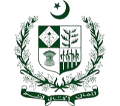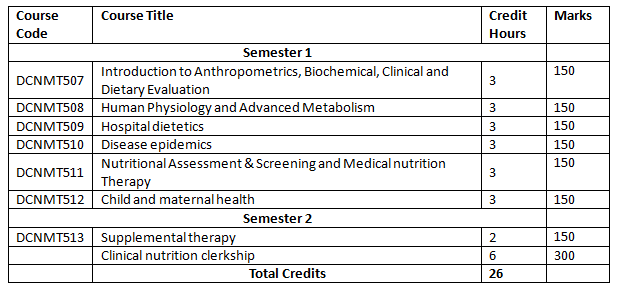Post Graduate Diploma In Clinical Nutrition In Medical Therapeutics
For instance, a diabetic cannot solely rely on metformin to control blood sugar without taking into account the dietary carbohydrates taken daily. Many reports have highlighted that pancreatic beta cell failure which initiates Diabetes Mellitus is mostly happening due to a condition known as insulin resistance. Hyperinsulinemia (due to insulin resistance) stems from consuming too much carbohydrate that the body cannot handle, ultimately leading to elevated plasma glucose levels despite the pancreas’s efforts to normalize it. Malnutrition in the context of under nutrition is also one of the factors accounting for death in hospitals (especially in cases of pediatric diarrhea). Previously, medical setups in Pakistan did not seem to incorporate nutritional intervention in patient care, and it was a rarity to find a dietitian in a hospital some thirty years ago. Although the situation has somewhat improved today, there is still an existing gap. One of the reasons for this is the general lack of awareness in the population about the healing power God Himself has placed in His own medicine: Food. Both inpatients and outpatients have specific nutritional requirements which could impact their health status if not met adequately. A drug may interact with certain nutrients in the body, or may impede their absorption. In some conditions, levels of certain nutrients can be depleted or elevated (as in the case of renal disease). Hence, it is important to address these factors when assessing for the patient’s health. Just as how training in medical sciences is undertaken, we need to equip students with the right knowledge (both theoretical and practical) and skills which will enable them to use the right dietary patterns and lifestyle counselling to treat (or at least manage) a disease/ health condition. The Post Graduate Diploma in Clinical Nutrition in Medical Therapeutics (CNMT) is a well-designed course for aspiring health care professionals looking to delve deeper in to the science of Clinical Nutrition, with the opportunity to apply the knowledge gained into practice within a clinical setting. It is suitable for those willing to work collaboratively as part of an integrated medical team, ensuring a better prognosis for patients. The Diploma in CNMT focuses on hospital dietetics, purely based on clinical application of nutrition. Upon completion, students will be able to work with both in and outpatients, addressing their nutritional requirements with an aim to improve their quality of life. As hospitals increase in size and number, there is therefore a need to employ clinical nutritionists in every department of a hospital, as it is expected that their demand will rise in the future. Incorporation of nutritionists in clinical settings can improve the quality and design of healthcare in Pakistan.
Competencies Of The Diploma CNMT Program
The graduates of the DCNMT program will be able to:
• Understand basic human physiology and how the body processes nutrients (both macro and micronutrients).
• Understand how pathology in disease progresses.
• Apply knowledge to communicate confidently and effectively with patients, keeping in mind the ethical principles of professional conduct.
• Use assessment techniques to identify signs of malnutrition according to the disease. understand the therapeutic use of foods in managing health conditions or diseases.
• Use foods to develop and implement the appropriate meal plan for a patient (in both inpatient and outpatient settings).
• Develop lifestyle and counselling skills to enable patients to adopt healthier lifestyle choices or achieve improvements in their nutritional status; and Coordinate well as part of a medical team
In order to achieve these core competencies each course has been tailored with its learning objectives which further lead to enrichment of the course content.
Methods of Assessment/Examination, Procedures and Rules:
1. Formative assessment: which is a mix of the tests, end of course examination, class and home assignments, class participation, interactive discussions, practical exercises, field works and/or group works, end of course examination, depending on the course outline (ongoing assessment);
2. Summative assessment: based on the end of semester examination papers. Summative assessments are held at the end of semesters and comprises of semester examinations paper each.
Age Limit
Total fee for One Year Diploma is Rs.120,000 which is payable in two instalments.
International Students: USD 1000


